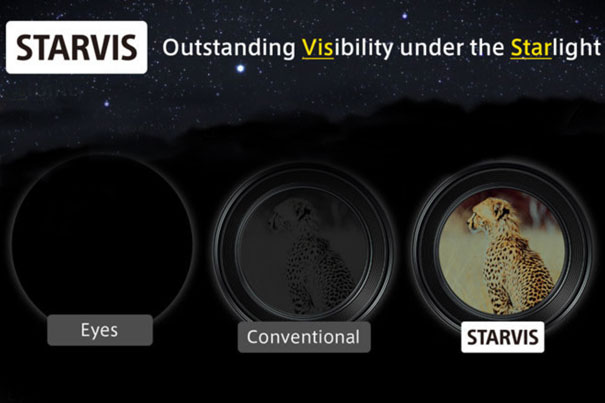
Visibility under the Starlight is where STARVIS got its name from. According to Sony, this new sensor provides high-sensitivity performance suitable for night filming.
Canon introduced recently and displayed at the Canon Expo 2015, in Paris, their Canon ME20F-SH camera with a sensitivity over 4 million ISO, and now it is Sony’s time to show their goods. One cannot stop thinking it all sounds as two kids fighting over who has the nicer toy, but the truth is that Sony technology seems also a viable option for those that need to film with clear images in a variety of environments.
The STARVIS sensor may come from surveillance, where there is more and more a need for cameras able to see in difficult conditions (a sign that does suggest the direction our “civilized” world is going towards…), but Sony is quick to state that STARVIS is also suitable for night filming. And the image of wildlife used to promote the technology does remind viewers of a night safari, somewhere in Africa.
STARVIS is a back-illuminated pixel technology used in CMOS image sensors for surveillance camera applications. It features a sensitivity of 2000 mV or more per 1 µm2 (color product, when imaging with a 706 cd/m2 light source, F5.6 in 1 s accumulation equivalent), and realizes high picture quality in the visible-light and near infrared light regions.
Sony states on their technology website that the sensor offers an optimum design for surveillance camera use. In addition to the back-illuminated structure, the sensitivity performance has been extended from the visible light range to include the near-infrared range to support filming at night, which is essential for surveillance camera use. In addition to the ability to illuminate dark environments, efficiently incorporating near-infrared light has also enabled clear filming at night.
The CMOS sensor is an Exmor R, back illuminated. Unlike the front-illuminated-type image sensor, the image is acquired through the back side where there are no obstacles such as wiring or circuits, so a wider range of light is collected on the photodiode, achieving high sensitivity. Moreover, it uses the very first pixel specifically developed for surveillance use in a back-illuminated structure.

While the announcement now made is surely the result of a long period of investigation, the video created to promote STARVIS seems a bit amateurish, and the voice repeating STARVIS multiple times during the one minute video does not help. In fact, the haste to put the video online was such, that on the information about the video someone wrote “We hae launched new technology brand “STARVIS” for security CMOS image sensor.” It is something Sony needs to correct before the video goes viral. And please, change the audio and that mantric STARVIS, which sounds almost religious.
To find more about STARVIS download the pdf document from Sony’s website.

Filmtools
Filmmakers go-to destination for pre-production, production & post production equipment!
Shop Now













